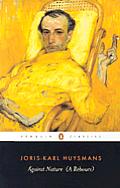 The French fin de siècle must have been an incredibly exciting era. Just think of the great technological progress of the 1880s: the decade that brought us synthetic perfumery, with fragrances like Houbigant’s Fougère Royale (1882) and Guerlain’s Jicky (1889). But they were also times of increasing pessimism: in French literature, a group of self-proclaimed Decadents turned their backs on the current known as Naturalism. With their harsh depictions of a civilization in decline, they reacted against the contemporary bourgeois ideal of eternal progress. Joris-Karl Huysmans, the most prominent member of the Decadent movement, uncovers the maladies of the late nineteenth century in his novel Against Nature (1884): it captures the essence of a vibrant, troubled, and altogether confusing period in history.
The French fin de siècle must have been an incredibly exciting era. Just think of the great technological progress of the 1880s: the decade that brought us synthetic perfumery, with fragrances like Houbigant’s Fougère Royale (1882) and Guerlain’s Jicky (1889). But they were also times of increasing pessimism: in French literature, a group of self-proclaimed Decadents turned their backs on the current known as Naturalism. With their harsh depictions of a civilization in decline, they reacted against the contemporary bourgeois ideal of eternal progress. Joris-Karl Huysmans, the most prominent member of the Decadent movement, uncovers the maladies of the late nineteenth century in his novel Against Nature (1884): it captures the essence of a vibrant, troubled, and altogether confusing period in history.
Against Nature is often described as an anti-novel with an anti-hero. The main character, Des Esseintes, is a neurotic, ailing, eccentric, bored, thirty-year-old aristocrat with a keen sense for aesthetics. After a young adult life marked by exuberance on all fronts, he feels the urge to move away from the ‘vulgarities’ of the Parisian upperclass. He finds his retreat in a quiet countryside mansion, where he spends much of his time and money on interior decoration; not the least interested in the idyllic green grass and blue skies of Fontenay, he creates a dark, gloomy ambiance to set his mind at ease.
Des Esseintes’ awkwardness manifests itself in a number of bizarre episodes. A famous case in point is his decision to ‘bling’ his turtle: the poor creature’s shell is glazed with gold and incrusted with rare stones, in order to create the right visual contrast with the Oriental rug on which it lies. Through an essay-like narration, we are further introduced to his peculiar taste in art and literature, and his fascination for specific minerals, plants, and perfumes. His aesthetic preoccupations are unbashful reflections of an uncompromising vision of Nature:
There can be no doubt about it: this eternal, driveling, old woman is no longer admired by true artists, and the moment has come to replace her by artifice.
Des Esseintes sees artifice as the “final distinctive mark of man’s genius”; and so we discover, in chapter 10, his fondness for artificial methods in perfumery. His experiments with a variety of fragrant oils are a form of aromatherapy avant la lettre; but more than anything, this chapter contains a convincing, historically unprecedented exploration of fragrance aesthetics. As such, Against Nature was referred to by perfumer Félix Cola in his Livre du Parfumeur (1930), and became a source of inspiration to many perfumers in subsequent decades. It’s a classic of decadentism and dandyism, touching upon a myriad of other subjects which have remained undiscussed here. Like Fougère Royale and Jicky in terms of perfumery, it served as the ultimate literary bridge to modern times.
You can read Chapter 10 of Against Nature on ScentedPages.
First published in 1884. Available from Oxford University Press (1998), Penguin Books (2003), and other publishers.
Original French title: À Rebours
Alternate English title: Against the Grain
Joris-Karl Huysmans (1848–1907) was a French novelist, and a founding member of the Académie Goncourt (a literary organization).
It's been more than ten years since I first read skimmed A REBOURS, so I've completely forgotten that amazing tenth chapter. I'm especially impressed with the reference to champaca, a flower I never heard of before until the Ormonde Jayne scent of the same name. What I found weird, and pedantic back then, now strikes me as funny, snobbish and fascinating. Obviously, I need to reread the whole novel, so I can decide whether JKH is being sincere in describing Des Esseintes's enthusiasms and dislikes, or if he's sending up the whole thing.
Have you ever read “La Bas”? Tons of copies at the huge used bookstore near me, and I always check it out, but never take it to the cash register. It doesn't seem as fun as “A Rebours,” but let me know if I'm mistaken.
Hello W,
I think that part of the appeal of this book is that some of the author's perceptions on art and aesthetics are reflected in the main character of his novel. Not that Des Esseintes equals Huysmans, of course, but the author was certainly not making the concept of decadentism up just for fun. A few years later he regretted some of his earlier views, and converted himself to catholicism. I haven't read La Bas, but I'm impressed with Huysmans' style, so I may pick up a copy of that one in the future.
Marcello, thank you for a review of this novel and for adding a chapter to Scented Pages. It is fascinating to consider the effect it had upon the aesthetic movement at the time of its debut (and how shocking).
A Rebours was Oscar Wilde's favourite book (surprise, surprise!). I read it as part of my research on OW (my MA thesis was about his plays), and found it very hard going. That chapter is very interesting, though.
Thanks for your comments, Victoria & Bela! I enjoyed reading this book. Must say I'm not very familiar with Oscar Wilde, but my gf told me to read The Picture of Dorian Gray next. I always listen to my gf 🙂